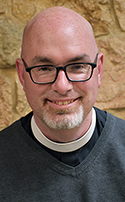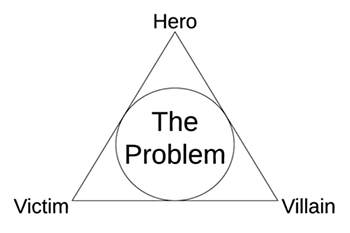| Search PNC News for stories of people and churches in our UCC Conference: |
|---|
The book, ‘Conflict Unraveled,’ helps churches, individuals
In my last column, I mentioned a book I was in the middle of reading and this month I’m going to mention a book I read several years ago. Conflict Unravelled by Andra Medea is one of the books I’ve recommended to churches and individuals along the way, and I’ve found it helpful. In addition to it being easy to read, it has tons of helpful diagrams and tools that have helped me reflect on conflicts I’m involved in and churches are involved in.
 |
Conference comments by Conference Minister Mike Denton |
One of the most helpful tools is called the Victim/Villain/Hero Cycle or, in other places, The Drama Triangle. It looks like this:
 |
The basics of this are pretty simple and it usually starts with the realization that someone is feeling hurt. (This all happens with groups, too, but for the purpose of this article I’m going to use an individual to explain this diagram.) We’ll call this person Chris, and Chris, by Chris’ own description or the perception of others, is seen as a victim. It’s at this point that blame is sometimes assigned for Chris’ pain. When one person is identified as a victim, it usually means that someone else is identified as a villain. We’ll call this person Taylor. When blame becomes part of the mix, some sort of punishment is easily rationalized and either Chris—or those who claim to be on Chris’ side—begin to try and punish Taylor for causing Chris’ pain. As this happens, Chris or Chris’ supporters move a position and become heroes. However, as Taylor begins to feel pain, they begin to see themselves—or those on Taylor’s side—as victims AND Chris and Chris’ supporters as villains. As Chris becomes blamed for Taylor’s pain, Taylor—or Taylor’s supporters—feel justified in somehow punishing Chris and Chris’s supporters, and on and on the cycle goes becoming faster and faster along the way.
In the meantime, there is some problem that remains unaddressed. Chris probably felt hurt because there was a communication problem or something was unfair or there is a difference in approaches around something, etc. Instead of solving the problem that led to Chris feeling hurt, this system seeks to place blame for Chris feeling hurt. Sure, Taylor may have done something Taylor shouldn’t have and Taylor may need to accept responsibility or be held accountable but only to the point where it contributes to solving the problem (admittedly, this is hard to figure out sometimes). Systems that insist on punishment and blame create their own problems and frequently solve none
We’ve all become stuck in this cycle at one point or another. It’s one of the ways we regularly interact and it’s not limited to personal interactions. Lived out largely, this way of interacting is deeply rooted in our criminal justice system and our financial systems. Our last several election cycles adopted this way of interacting. We’re now in a state of perpetual global war that demands more and more to feed it. Once we start to see some of the places this triangle is present, we start to see it everywhere. It’s an insidious, tempting and addictive system that promises the permanence of heroism. It is built on the lies that we can avoid responsibility, that we can avoid pain, and that humiliation is more powerful than humility.
The good news is that we have the tools to step off this triangle. They might seem a little scary, at first, but in the long run the energy we have to put into slowing down and stopping this cycle is significantly less than the energy required to maintain this cycle.
First, we can confess or take responsibility. The truth can set us free ... from the drama. Then, we can make room to hear the concerns of those who might be stuck in the same cycle with us. We need to remember that they are also a good person doing the best they can. Together, we can name the problem in the middle of the triangle. We can pray together and for each other. Finally, we can make a commitment and plan to work on the problem together. We know that this isn’t a magical formula, and we might have to go through a few rounds of it. We also should realize that it’s a persistent pattern and that it’s easier to fall back into it, at first, than move forward.
Many of us know the old song, “Let there be peace on earth and let it begin with me…” Stepping off the Victim/Villain/Hero cycle—and inviting others to come along—can be a really good start.
Pacific Northwest Conference UCC News © Summer 2017
